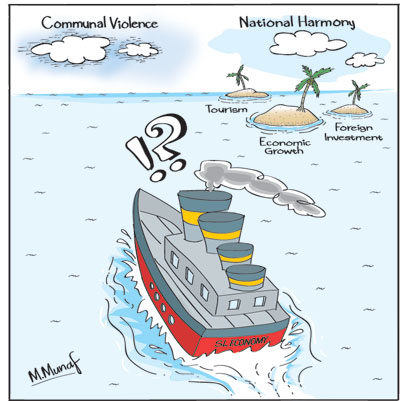Columns
Containing communal conflict vital for economic development
View(s):The violence at the University of Jaffna on July 16th has brought to the forefront once again the need to contain communal conflict to ensure the progress of the economy. It is imperative to nip in the bud such communal tensions that could ruin economic growth once again. Another setback to the economy due to communal violence at a time when the country is grappling with a serious crisis in its external finances could be catastrophic.
 Ethnic conflict has been the most serious impediment to the country’s economic development since independence. The several ethnic clashes since 1958 and, especially the July 1983 ethnic violence and the near-three-decade war dealt a severe blow to the economy. Once again if the ethnic tensions are not contained, economic development would receive a severe setback.
Ethnic conflict has been the most serious impediment to the country’s economic development since independence. The several ethnic clashes since 1958 and, especially the July 1983 ethnic violence and the near-three-decade war dealt a severe blow to the economy. Once again if the ethnic tensions are not contained, economic development would receive a severe setback.
Initial response
The immediate response of the Government and the responsible section of the opposition, including the TNA and the JVP, was to calm the situation. This was the immediate need as such conflicts can spread quite easily to other universities and places on the basis of rumours and half-truths. The immediate dangers appear to be defused.
However, the deeper causes behind the incident at the Jaffna University require a thorough study and investigation and lasting solutions must be found to ensure social harmony at the university. The reasons behind the violence have been justifiably downplayed. They must be looked into and resolved to prevent any repetition of ethnic tensions at universities. A strict code of conduct must be enforced to prevent such violence.
 Durable solution
Durable solution
The underlying causes of ethnic tensions are complex and remedying them is an enormous task. First of all there must be a comprehensive inquiry into justified grievances among students in all universities. For instance, is it true that university communications are in a single language? Are there moves to exclude cultural activities of some communities in universities (not only Jaffna)? Are university faculty and administrations sowing seeds of discontent among some communities? What are the positive moves that the university administrations and students have taken to build bridges among different communities?
Ethnic harmony
Building a harmonious university community is as much a priority as imparting a good university education. The biggest obstacle to student unity and social cohesion has been the fact that most students know only one language. Even when the medium of instruction is English students hardly converse other than in Sinhala and Tamil. A common language is vital to ensure social interaction.
English
No long-term solution could be found without English as the common language. The social harmony among university students in the 1950s and 1960s was mostly due to their language commonality that ensured social interaction among students. English language proficiency has been inadequate to enhance the quality of education as well as social interaction among students of different ethnic communities.
Economic imperative
Ensuring communal harmony is imperative for economic development. No other factor has retarded the country’s economic development as much as ethnic disturbances. The economic impacts of the series of ethnic disturbances since independence, especially the nearly three decade war, are immense. Peace and harmony are particularly important at this juncture when the country is facing a crisis in its external finances.
The balance of payments could be adversely affected and the crisis aggravated if tourism that is expected to earn more than US$ 2 billion this year and grow at around 15 percent is affected badly. Foreign investment that is essential for rapid economic growth could be severely affected by any signs of violence. Sri Lanka’s capacity to borrow in international markets, too, could be affected with the country having to pay higher interest rates. These are in addition to setbacks to production that may also occur.
History of violence
Sri Lanka’s post-independent history is replete with economic setbacks owing to ethnic violence. The ethnic riots of 1958 were the initial setback to the country’s development. In addition to the physical destruction, human suffering and fatalities, it led to an exodus of talented persons in a first wave of a brain drain that was repeated with each wave of ethnic tensions. The flight of academics, professionals, scientists, technicians and qualified persons has weakened the economic capacity of the country.
Economic burdens
The most debilitating factor since 1983 has been ethnic violence and the war in the North and East. They not only absorbed considerable funds and were a burden on the public finances, but also created an inhospitable climate for investment, tourism and the establishment of hi-tech industry.
The mismanagement of the ethnic issue has been a deep-rooted cause for the country’s modest economic development. The war was a financial burden, an impediment for investment and crippled several areas of production in the economy. It set back the economic development of the country at a time when the economy was in full swing in 1982-83. Large foreign companies shunned investing in Sri Lanka and preferred more stable countries like Malaysia, Singapore and Vietnam. The ethnic disturbances of 1983 and the insecurity caused by the war was the main deterrent to foreign investment.
Economic benefits
Without a durable solution to the ethnic problem, the brain drain will continue, foreign investors would be wary of political instability, the educational and skills development of the country would be stifled and the country would be continuously distracted from the tasks of economic development by communal disharmony.
The country’s economic engine cannot fire with all its pistons without all communities feeling that they belong to this Island nation as equal citizens with equal rights and opportunities. Achieving durable reconciliation and building a solid sense of nationhood is neither easy nor possible in a short period of time. What is needed is movement in the correct direction.
The violence at the Jaffna University must be looked at as an opportunity to seriously address the issues of national reconciliation. The economic gains of a united nation should spur the Government and people towards the settlement of the ethnic issue expeditiously and with consummate skill.


Leave a Reply
Post Comment